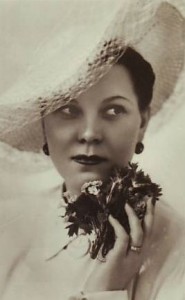 Klavdiya Ivanovna Shulzhenko (Russian: Êëàâäèÿ Èâàíîâíà Øóëüæåíêî; 24 March [O.S. March 12] 1906, Kharkiv — June 17, 1984, Moscow) was the most popular female singer of the Soviet Union before the rise of Sofia Rotaru's star in the 1970s. Sofia Rotaru was awarded with "Klavdiya Shulzhenko Prize" and named best pop singer in 1996.
Klavdiya Ivanovna Shulzhenko (Russian: Êëàâäèÿ Èâàíîâíà Øóëüæåíêî; 24 March [O.S. March 12] 1906, Kharkiv — June 17, 1984, Moscow) was the most popular female singer of the Soviet Union before the rise of Sofia Rotaru's star in the 1970s. Sofia Rotaru was awarded with "Klavdiya Shulzhenko Prize" and named best pop singer in 1996.
Shulzhenko started singing with jazz and pop bands in the late 1920s. She rose to fame in the late 1930s with her version of Sebastian Yradier's La Paloma. In 1939, she was awarded at the first all-Soviet competition of pop singers.
During World War II, Shulzhenko performed about a thousand concerts for Soviet soldiers in besieged Leningrad and elsewhere. The lyrics of one of her prewar songs, The Blue Headscarf, were adapted so as to suit wartime realities. Another iconic song of the Great Patriotic War, Let's Smoke, was later used by Vladimir Menshov in his Oscar-winning movie Moscow Does Not Believe In Tears. In 1945, Shulzhenko was awarded the Order of the Red Star.
On April 10, 1976 Shulzhenko performed to enraptured audience in the Column Hall of the House of Unions[citation needed] in what would become her most famous concert. She, as traditional classical singer, was named People's Artist of the USSR in 1971.
From Wikipedia, the free encyclopedia.
photo from: http://klavdia-shulzhenko.narod.ru/
